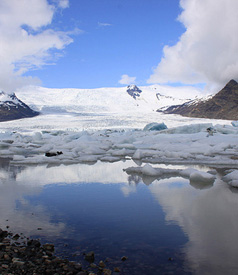Climate Change a Distant Problem for Americans
 Hervι Kempf - Le Monde Hervι Kempf - Le Monde
go to original
October 30, 2009


| | Climate change attitude researcher Anthony Leiserowitz: "The first image that comes to people's mind is the melting of the glaciers, the break-up of the ice caps. But few of us live on the shores of the Arctic or Antarctic oceans. Therefore, climate change is a distant problem." (ChrisGoldNY/Flickr) |  |
What do Americans think about climate change? The success of Al Gore's film, "An Inconvenient Truth," may have allowed us to imagine this phenomenon had become a major concern. However, at the same time, the strength of "climate skeptics" and of the opposition to the proposed climate change law in Congress show that the question is far from settled.

A team of sociologists has been studying American attitudes on the subject for several years. Their final report, entitled, "Global Warming's Six Americas 2009", was published in May. The study, piloted by Yale University's Anthony Leiserowitz, is based on an in-depth questionnaire submitted to 2,189 citizens at the end of 2008.

"Not in the USA"

One of the first lessons is that, although climate change has entered the collective consciousness, it remains a distant concern: "The first image that comes to people's mind is the melting of the glaciers, the break-up of the ice caps," says Anthony Leiserowitz, in his Yale University office. "But few of us live on the shores of the Arctic or Antarctic oceans. Therefore, climate change is a distant problem. Certainly, 71% of people believe it is happening, 55% believe its cause is human, and three quarters of the population consider it a serious threat. But it remains a low priority, behind the economy, education, health care, the wars in Afghanistan and Iraq, and terrorism. In fact, most Americans believe that climate change is a problem distant in time - it will manifest itself in several decades - and, most especially, in space - it will have consequences for other people and in other places, but not in the United States."

Another observation: The American public is far from monolithic. The study allows six families to be distinguished: the "alarmists," very worried and changing their own behavior (18 percent of the people surveyed); the "concerned" (33 percent), convinced of the problem, but who do not get personally involved; the "cautious" (19 percent); the "disengaged" (12 percent); the "unconvinced" (11 percent), who, to varying degrees, recognize the problem, but are uninformed and involve themselves little; and the "skeptics" (7 percent), who deny climate change.

One of the study's lessons is that positioning on this range of attitudes corresponds neither to a demographic parameter (woman, man, young, old, Black, Hispanic etc.) nor even to a political one (Republican or Democrat). On the other hand, an important factor for membership in one of these families is the person's basic value system and, in particular, their position with respect to the idea of equality: "Those who are the most equalitarian are the most concerned about climate change," observes Anthony Leiserowitz. "Conversely, the more individualistic a person is, the less they care about it."

Translation: Truthout French Language Editor Leslie Thatcher. |



